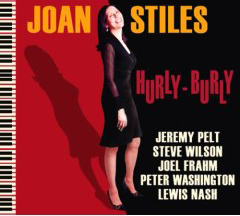Review by Brad Walseth
One of the most enjoyable recordings to come along so far this year, pianist Joan Stiles' Hurly Burly will have you grinning ear to ear even before the first song - an audacious merging of Monk, Johnny Hodges and Duke Ellington called "The Brilliant Corners of Thelonious' Jumpin' Jeep" - finishes spinning its crazy-quilt pattern of disparate styles somehow woven together into a coherent and exciting whole. This piece is recorded with a sextet featuring Peter Washington on bass, Lewis Nash on drums and a stellar horn section consisting of Joel Frahm on tenor sax (who provides a fine solo), Steve Wilson on alto and Jeremy Pelt on trumpet, and the band is smoking hot. Topping everything is Stiles' delightful Monk-inspired pianism that pushes the tune into euphoric fun.
A bass-less trio version of Fats Waller's "Jitterbug Waltz" is given an incredible Monk- meets-Waller feel by Stiles, while Wilson scintillates on his tenor. "Hurly Burly (J2Mary Lou)" is dedicated to Stiles' musical heroine - the great, and still somewhat underappreciated Mary Lou Williams (whose surname was Burly). Stiles has made it a point to cover the music of Williams in concert and on record throughout her career. This shifting sextet potboiler lets Wilson and Pelt stretch out with tasty results. Stiles plays the driving boogie bass left hand lines like Williams was noted for, while also to be noted is the fine work by this first rate rhythm section. Monk's ballad "Pannonica" is highlighted by Lewis' perceptive drumming, Pelt's graceful flugelhorn and Stiles' amazingly responsive and inventive accompaniment. Her classical background seems in evidence here, as throughout the recording, as well as her intensive study of the masters of jazz keyboard - Williams, Hank Jones, Horace Silver, Wynton Kelly, Willie the Lion and of course, the great Monk.
Stiles shows her chops as a singer on the Ray Charles-penned "What Would I do Without You" - a duet with Wilson, although her piano offers luscious counterpoint to her bluesy vocals - making it more like a trio. "Past Imperfect" offers up a standard trio format - piano, bass & drums - and this waltzing original recalls to mind some of Bill Evans' masterful trio work, especially in Stiles' harmonic escalations. Duke Ellington's "All Too Soon" follows, again as a traditional trio, but this ballad is taken at burner speed that may leave the listener breathless. A solo performance of the oft-covered "'Round Midnight" surprises as Stiles is able to glean fresh ideas from this beloved, but well-worn standard, hinting at what Chopin may have done with the tune had he been hanging out at Minton's back in the day. The bebopping, Williams-written "Knowledge" features a quartet line-up and is driven by Nash's pyrotechnic drumming. The song also serves as a reminder at how influential Williams was to the development of modern jazz rhythms and harmonies.
More classic jazz pianists are referenced with a quartet version of Jimmy Rowles' "The Peacocks" where Frahm solos again on tenor, and Stiles exhibits a bit of Rowles along with a touch of Errol Garner in her romantic flourishes. The sextet returns for a funky Stiles original - "Bluesicity" that again gives the players a welcome chance to cut and burn. The closer, "In the Land of Oo-Bla-Dee," is a charming boogie-woogie fairytale (again co-written by Williams) featuring Stiles on lead and backing vocals (as the Joanettes) that ends the album on a note of joyous fun.
"Hurly Burly" is an engaging album that lives up to its name in presenting a wide range of "Stiles" within a mainstream jazz element. In her second release, Joan Stiles shows herself to be a remarkable arranger and bandleader, as well as one of the best and most interesting jazz pianists within the genre today.
|

